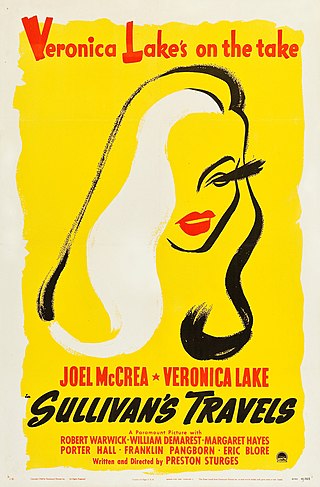
Sullivan's Travels is a 1941 American comedy film written and directed by Preston Sturges. A satire on the film industry, it follows a famous Hollywood comedy director who, longing to make a socially relevant drama, sets out to live as a tramp to gain life experience for his forthcoming film. Along the way he unites with a poor aspiring actress who accompanies him. The title is a reference to Gulliver's Travels, the 1726 novel by satirist Jonathan Swift about another journey of self-discovery.
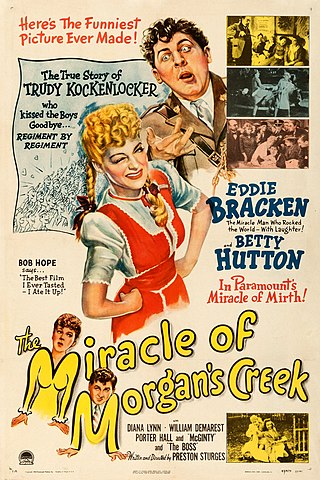
The Miracle of Morgan's Creek is a 1944 American screwball comedy film written and directed by Preston Sturges, starring Eddie Bracken and Betty Hutton, and featuring Diana Lynn, William Demarest and Porter Hall. Brian Donlevy and Akim Tamiroff reprise their roles from Sturges' 1940 film The Great McGinty. Set against the backdrop of World War II-era America, its plot follows a wayward young woman who, after attending a party with soldiers in her small town, awakens to find herself married and pregnant, with no memory of her new suitor's identity.
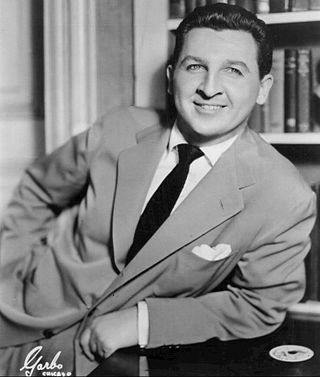
Edward Vincent Bracken was an American actor. Bracken came to Hollywood prominence for his comedic lead performances in the films Hail the Conquering Hero and The Miracle of Morgan's Creek both from 1944, both of which have been preserved by the National Film Registry. During this era, he also had success on Broadway, with performances in plays like Too Many Girls (1940).
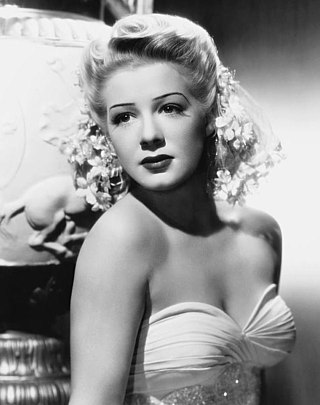
Betty Hutton was an American stage, film, and television actress, comedian, dancer, and singer. She rose to fame in the 1940s as a contract player for Paramount Pictures, appearing primarily in musicals, and became one of the studio's most valuable stars of that decade. She was noted for her energetic and sometimes manic performance style.

Preston Sturges was an American playwright, screenwriter, and film director.

The Great McGinty is a 1940 American political satire comedy film written and directed by Preston Sturges, starring Brian Donlevy and Akim Tamiroff and featuring William Demarest and Muriel Angelus. It was Sturges's first film as a director; he sold the story to Paramount Pictures for just $10 on condition he direct the film. Sturges received an Oscar for Best Original Screenplay.

Carl William Demarest was an American actor, known especially for his roles in screwball comedies by Preston Sturges and as Uncle Charley in the sitcom My Three Sons from 1965-72. Demarest, who frequently played crusty but good-hearted roles, was a prolific film and television actor, appearing in over 140 films, beginning in 1926 and ending in the late 1970s. Before his career in movies, he performed in vaudeville for two decades.

Easy Living is a 1937 American screwball comedy film, directed by Mitchell Leisen, written by Preston Sturges from a story by Vera Caspary, and starring Jean Arthur, Edward Arnold, and Ray Milland. Many of the supporting players became a major part of Sturges' regular stock company of character actors in his subsequent films.

The Palm Beach Story is a 1942 screwball comedy film written and directed by Preston Sturges, and starring Claudette Colbert, Joel McCrea, Mary Astor and Rudy Vallée. Victor Young contributed the musical score, including a fast-paced variation of the William Tell Overture for the opening scenes. Typical of a Sturges film, the pacing and dialogue of The Palm Beach Story are very fast. The film was distributed by Paramount Pictures.

Esther Howard was an American stage and film character actress who played a wide range of supporting roles, from man-hungry spinsters to amoral criminals, appearing in 108 films in her 23-year screen career.
Norman Gimbel was an American lyricist and songwriter of popular songs and themes to television shows and films. He wrote the lyrics for songs including "Ready to Take a Chance Again" and "Canadian Sunset". He also co-wrote "Killing Me Softly With His Song". He wrote English-language lyrics for many international hits, including "Sway", "Summer Samba", "The Girl from Ipanema", "How Insensitive", "Drinking-Water", "Meditation", "I Will Wait for You" and "Watch What Happens". Of the movie themes he co-wrote, five were nominated for Academy Awards and/or Golden Globe Awards, including "It Goes Like It Goes", from the film Norma Rae, which won the Academy Award for Best Original Song for 1979. Gimbel was inducted into the Songwriters Hall of Fame in 1984.

Jimmy Conlin was an American character actor who appeared in almost 150 films in his 32-year career.
The 16th National Board of Review Awards were announced on 23 December 1944.

Francis Charles Moran was an American boxer and film actor who fought twice for the Heavyweight Championship of the World, and appeared in over 135 movies in a 25-year film career.
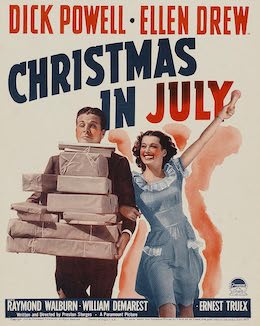
Christmas in July is a 1940 American screwball comedy film written and directed by Preston Sturges, and starring Dick Powell and Ellen Drew.

Diamond Jim is a 1935 biographical film based on the published biography Diamond Jim Brady by Parker Morell. It follows the life of legendary entrepreneur James Buchanan Brady, including his romance with entertainer Lillian Russell, and stars Edward Arnold, Jean Arthur, Cesar Romero and Binnie Barnes.
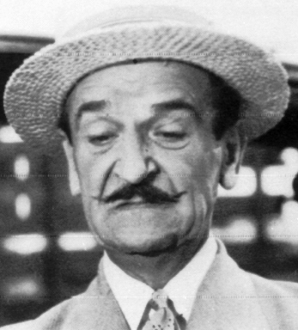
Jack Norton was an American stage and film character actor who appeared in more than 180 films between 1934 and 1948, often playing drunks, although in real life he was a teetotaler.
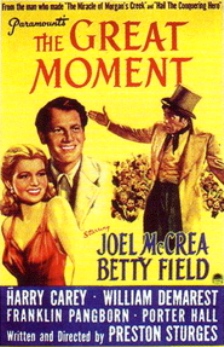
The Great Moment is a 1944 biographical film written and directed by Preston Sturges. Based on the book Triumph Over Pain (1940) by René Fülöp-Miller, it tells the story of Dr. William Thomas Green Morton, a 19th-century Boston dentist who discovered the use of ether for general anesthesia. The film stars Joel McCrea and Betty Field, and features Harry Carey, William Demarest, Franklin Pangborn and Porter Hall.
Harry Rosenthal was an orchestra leader, composer, pianist and actor.
Ernst Fegté was a German art director. He was active in the American cinema from the 1920s to the 1970s, he was the art director or production designer on more than 75 feature films. He worked at Paramount Studios at the height of his career and won an Academy Award for Best Art Direction for Frenchman's Creek (1944). He was also nominated in the same category for three other films: Five Graves to Cairo (1943), The Princess and the Pirate (1944), and Destination Moon (1950). He also worked in television in the 1950s and was nominated for an Emmy Award in 1956 for his work on the series, Medic.
















